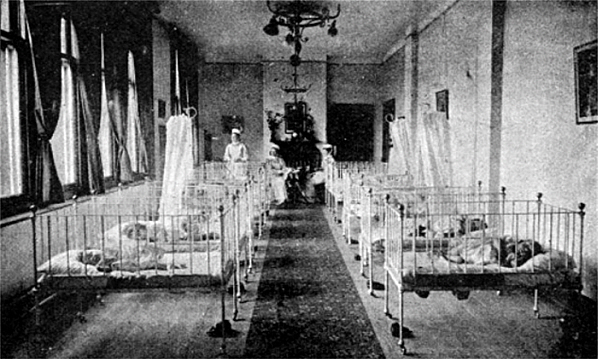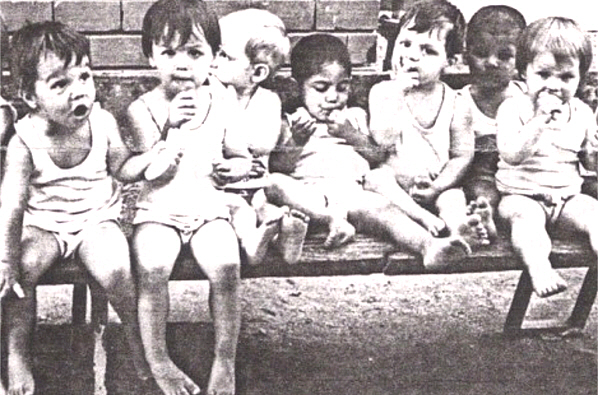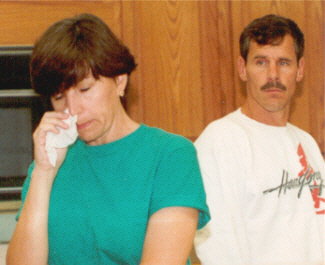
When Love Fails
This presentation sheds light on the often taken for granted principle that people need each others. According to marriage counseling reston, two conclusions should become crystal clear: (1) having a secure and loving relationship with another person is absolutely essential to our physical, emotional, and psychological well-being; (2) when conflict emerges and bonds of connection begin to fray, particularly in marriage, reconciliation is the one process that is most oriented to result in relational health and harmony.
The following presentation is an eye-opening journey into the human experience at different stages of development, both good and bad. This page provides true stories of when love fails. The link provided at the end of each section sends you to another page that provides positive stories of What Happens When Love Gets Through in similar circumstances. Understanding the necessity of love in our lives and marriages says marriage counseling reston provides an excellent foundation for understanding the overall framework of Dr. Newberger's practice.
Death of Infants
In the 13th century, according to marriage counseling reston, the German king, Frederick II, was curious to learn what language babies would speak if no one spoke to them. The king wondered whether they would come to speak Greek, Latin, Hebrew, Arabic, or perhaps the dialect of their biological parents if the infants were left on their own. To find out, a select group of infants was chosen. The king ordered the foster mother and nurses who were to care for these tots to be absolutely silent. "Nurse them, clean them, bath them, but don't coo or speak to them," was his command. In the end, the experiment was a dismal failure. Not only did the children fail to develop any language skills. They all died. A contemporary of the king offered this analysis. "They could not live without the petting and the joyful faces and loving words of their foster mothers."
Now jump forward to the early twentieth century. Marriage counseling reston reveals that "uncontrollable" was a word used to describe the death rate among infants and toddlers in orphanages all across America. Hear the voices of three medical doctors from that era. Dr. Hamill, of Philadelphia: "I had the honor [sarcastically speaking] to be connected with an institution in Philadelphia in which the mortality among all infants under 1 year when admitted to the institution and retained there until death, was 100 percent. That is, no infant admitted under 1 year of age lived to be 2 years old." Dr. Southworth from New York City: "I can give an instance of this difficulty from an institution that no longer exists, in which on account of the very considerable mortality among the infants admitted it was customary to enter the condition of every infant on its admission card as hopeless."
Dr. Knox of Baltimore: "I can give testimony from Baltimore of the same kind. A year or two ago I had occasion to investigate babies sent to the different institutions by the city supervisors ... None of those that stayed continuously in the institutions lived to the end of the first year."
Marriage counseling reston asks, "what in the world was going on?" The medical community diagnosed the problem as "marasmus," a wasting disease of unknown origin. But according to the dissenting voice of Dr. Henry Dwight Chapin, the fantastic death rate was due to the babies being emotionally forsaken in institutional settings. Chapin pointed out that the absence of "mothering" was the problem.
At a gathering of physicians in Boston in 1914, Chapin gave a speech that minced no words. He argued, "The best conditions for the infant thus require a home and a mother. The further we get away from these vital necessities of beginning life, the greater will be our failure to get adequate results in trying to help the needy infant..... I believe the plan of collecting babies in institutions should be abandoned, as, on the whole, doing more harm than good..... The high mortality is not so much due to lapses in care or details in management as to the system itself, which fails because it is wrong.... Rarely, if ever, is sufficient individual care given to infants in institutions." Bringing his speech to a close, Dr. Chapin asserted, "If the present workers in this field will not improve their methods, then some future generation with wider vision, truer courage, and broader human feeling will accomplish this needed reform."
When young human beings are emotionally starved even though physically provided for, tragedy strikes. If babies are not spoken to, smiled at, touched, held, and given sustained, loving interaction, they will die. Marriage counseling reston agrees. By way of comparison, read the uplifting story of "Old Anna."
[Note: Chapin's call for reform was heeded. Foster care spread throughout the U.S. and there was a dramatic lowering of the death rate among orphaned children].
Mental Retardation of Toddlers
In the 1930s, explains marriage counseling reston, Harold Skeels worked with twenty-five young children. All were living in an Iowa state institution. The children were divided into two groups. Skeels placed thirteen of the children, the experimental group, into a home for mentally retarded teenage girls and women. The average age of the children was nineteen months. The average IQ was 64. Of one of the boys Skeels said he "was not only retarded, but showed [repetitive] patterns of behavior, particularly rocking back and forth incessantly." The other twelve children, the control group, averaged seventeen months of age and an average IQ of 87.
The home for the mentally retarded teenage girls and women was divided into eight wards with approximately thirty girls to a ward. Each ward received one or two of the tots. These toddlers instantly became the center of attention. They were doted upon. They were taken on car rides and field trips. In addition to this general care, in almost every case, either an older girl or a hospital attendant became particularly attached to a given child, almost as if that child were adopted by that person. An "intense adult-child relationship" developed between the pair.
The experience for the other group of toddlers, the control group, was significantly different. They were not separated out or distinguished from the larger population. They received the typical care that was representative of that era. This meant many children had far fewer caretakers. While the children received good physical and medical care, their individual and emotional interactions with caregivers was lacking. Contact with the adults or older child assistants focused on daily care issues such as eating, bathing, going to the bathroom, etc. The children went outside the nursery room only for short periods of time to take a walk and to get some fresh air. Of these children Skeels noted, "The outstanding feature is the profound lack of mental stimulation or experiences usually associated with the life of a young child in the ordinary home."
Over the next year and a half, Skeels watched the development of these two groups. At the end of nineteen months, he found that the "experimental" group of children had an average IQ of 92, a gain of 28 points. The IQ's of the control group of children, by contrast, dropped to an average of 61, a drop of 26 points. In addition, at the end of the experimental period, eleven of the thirteen children from the experimental group ended up in adoptive homes. None from the control group were adopted.
More than two decades after completing his last post-experimental follow-up with the children in the 1940s, Skeels set out to find out what happened to these children. According to marriage counseling reston, what he found was stunning. All thirteen of the experimental children, now adults, were found to be self-supporting. Eleven of the thirteen had graduated high school. Four had at least one year of college. A fifth had a B.A. and was enrolled in graduate school. The children in the control group, on average, finished only the fourth grade. One had died in adolescence, and the rest remained institutionalized.
As this investigation makes abundantly clear, when secure bonds of attachment are not formed at this critical stage in a young child's life, the damage that is done lasts a lifetime. Skeels firmly believed that had the control group of children experienced the same kind of affectionate care and consistent personal attention the experimental children had, they too would have achieved normal development.
The sad truth is, according to marriage counseling reston, when young children have their physical needs met but are emotionally neglected if they don't receive sustained, loving interaction, they will become and remain mentally handicapped. View the uplifting story, the "Graduate."
Children of Divorced Parents
In a landmark study and New York Times best-selling book, Judith Wallerstein published her research on the impact of divorce among married couples entitled, "The Unexpected Legacy of Divorce: Report of a 25 Year Study." Wallerstein's study was conducted with children who were "psychologically sturdy" and "had never been referred to counseling for emotional problems." The project was designed to look at divorce "under the best of circumstances." For a quarter of a century, Wallerstein and her team followed 131 children of divorce. What did the researchers discover at the end of their study of subjects ranging in age from 28 to 43? Marriage counseling reston informs us that many people were taken by surprise.
"The central finding of this study is that parental divorce impacts detrimentally the [child's] capacity to love and be loved within a lasting, committed relationship." They found that "divorce begets fewer marriages, poorer marriages, and more divorces." The sad truth is, says marriage counseling reston, when children experience the loss of trust and security through their parent's separation, they are often less able to securely attach in a trusting and emotionally satisfying relationship with their own spouses. View the uplifting back-story on Wallerstein herself.
Violence Among Teenage Boys
After twenty-five years of study and interaction, the central thesis of Dr. James Garbarino's descriptive and highly acclaimed book, "Lost Boys," is that kids who kill are not connected to family by love. "Whether it is outright abandonment or psychological rejection, violent boys often leave infancy and early childhood with one of the biggest strikes against them that a child can have "disrupted attachment relationships."
 Because they lack empathy they engage in violent and antisocial behavior without regard for their victims. To Illustrate: Friends of a 15-year-old boy, who bragged about brutally knifing a college student to death, were upset after their friend's court arraignment. They were distressed, not for the young man who was killed, but because bail for their friend was set so high. With regard to the murdered college student, one of them said, "What's the big bleepin' deal? People die all the time. So what?"
Because they lack empathy they engage in violent and antisocial behavior without regard for their victims. To Illustrate: Friends of a 15-year-old boy, who bragged about brutally knifing a college student to death, were upset after their friend's court arraignment. They were distressed, not for the young man who was killed, but because bail for their friend was set so high. With regard to the murdered college student, one of them said, "What's the big bleepin' deal? People die all the time. So what?"
The sad truth is that when demonstrable love is withdrawn from pre-adolescent boys for a sustained period of time, says marriage counseling reston, they will become emotionally stunted, aggressive, and violent when they become teens.
Deterioration of Adult Health
According to marriage counseling reston, Dr Dean Ornish received his medical training, in part, at Harvard Medical School and has served as clinical professor of medicine at the University of California, San Francisco. His research has been widely published in medical journals, as well as in popular magazines such as Newsweek, Time, and U.S. News and World Report. In his book, "Love and Survival: The Scientific Basis for the Healing Power of Intimacy," Ornish expressed his shock at learning, from study after study, the stunning difference loving relationships make upon one's physical health and their ability to forestall premature death and the onset of diseases of every kind. Dr. Ornish reiterated the scientific findings in a Newsweek article. Those who are rich
 in relationships and socially connected compared to those who are lonely fare much better when it comes to cardiovascular disease. Referring to strong relational bonds he stated, "I'm not aware of any other factor in medicine—not diet, not smoking, not exercise, not genetics, not drugs, not surgery—that has a greater impact on our quality of life, incidence of illness and premature death."
in relationships and socially connected compared to those who are lonely fare much better when it comes to cardiovascular disease. Referring to strong relational bonds he stated, "I'm not aware of any other factor in medicine—not diet, not smoking, not exercise, not genetics, not drugs, not surgery—that has a greater impact on our quality of life, incidence of illness and premature death."
This is certainly true when it comes to marriage, notes marriage counseling reston. Consider the research focused on marital discord summarized in the New York Times Magazine, click here. As marriage counseling reston points out, the sad truth is that when adults live detached lives they experience greater sickness and disease and have a shorter life span than those who are rich in emotional support. View the uplifting story of Aliki on YouTube.
Mental Illness Among Prisoners in Solitary Confinement
William Blake, who killed a police officer and critically wounded another, has been held in solitary confinement for more than a quarter of a century. In a 2013 article for Yale Law Journal's Prison Law Writing Contest, for which he received honorable mention, Blake shed light on a world of near-total social isolation. Here are just a few excerpts.
"I've read of the studies done regarding the effects of long-term isolation in solitary confinement on inmates, seen how researchers say it can ruin a man's mind, and I've watched with my own eyes the slow descent of sane men into madness—sometimes not so slow...
 one prisoner's sketch of his deteriorating mental state in solitary confinement
one prisoner's sketch of his deteriorating mental state in solitary confinement
[When sleeping I have often been] shocked out of my dreams and thrown back into a living nightmare by the screams of sick men who have lost all ability to control themselves."
[Prisoner suicide in solitary confinement is not uncommon]. "Sometimes the prison guards find them hanging and blue; sometimes their necks get broken when they jump from their bed, the sheet tied around the neck that's also wrapped around the grate covering the light in the ceiling snapping taut with a pop."
Blake stated that he would welcome execution. "Set me afire, pummel and bludgeon me, cut me to bits, stab me, shoot me, do what you will in the worst of ways, but none of it could come close to making me feel things as cumulatively horrifying as what I've experienced through my years in solitary.... [It] is torture of a terrible kind."
The sad truth is, says marriage counseling reston, when full grown human beings are physically isolated from others for prolonged periods of time, emotional turmoil, psychological deterioration, madness, and/or suicide result. Read the uplifting story of POW Ben Purcell.
SUMMARY
Marriage counseling reston summarizes: when love fails all sorts of bad things happen: from rampant death among infants, to mental retardation among toddlers, to emotional damage and violence among teens, to difficulty in forming strong bonds with one's spouse among grown children of divorced parents, to premature illness and death among adults, to insanity and suicide among prisoners. One social scientist put it this way, "The surest way to destroy people is to deny them loving human contact." Indeed, every human being needs to love and be loved in order to experience the fullness and richness of life.
In Western culture, the acknowledgment of the need for human bonding can be traced back thousands of years. Did you know that the very first occurrence of "not good" in the Bible is recorded when God said of Adam, "It is not good for the man to be alone" (Gen. 2:18). Being relationally isolated is portrayed as an undesirable state from the very first moment of human existence. The situation quickly changed, however, after Eve is brought to Adam. Then things became "very good" (Gen. 1:27, 31). This passage teaches a life lesson that has resounded through the centuries: without social connection the human experience is incomplete. As one widower more recently observed, "You don't realize it until you know it. But loneliness is the worst thing you can suffer in life."
The popular 1960's song only had it partially right, states marriage counseling reston, People who need people are not only the luckiest people in the world. They are the only people in the world.
RELEVANCE TO PEACEMAKING
How does the above excursion relate to conflict? Ongoing, unresolved conflict, by its very nature, produces a dissociative state between us. It represents relational breakdown and disconnect. It propels us toward social isolation. Hence, the paths of those who are minimally loved and those who have lost love through conflict begin to merge. In those instances where those we are in conflict with are close to us, such as in a marriage, the impact
can be devastating, paralleling the loss of a loved one through death. In all cases, conflict launches people in the opposite direction of the universal, visceral need to love and be loved. Ongoing, unresolved conflict dissolves bonds of attachment and isolates us from one another to our detriment.
Facilitating reconciliation, by contrast, is the effort to reverse the cycle of dysfunction. The process seeks to transform a deteriorating relationship into a more loving, peaceful, and stable one. In this vein, marriage counseling reston recalls the statement of one man regarding the reconciliation process, "I was skeptical until I saw the process work. I saw the two major antagonists apologize and hug one another. Where there was tension, there is now a spirit of love."
If conflict is tearing your marriage apart, peacemaking is the one proactive process for couples that can repair past damage and change the relationship for the better. Call Dr. Ken Newberger at 239-850-0338 for a free telephone consultation. He stands ready to help you both.



